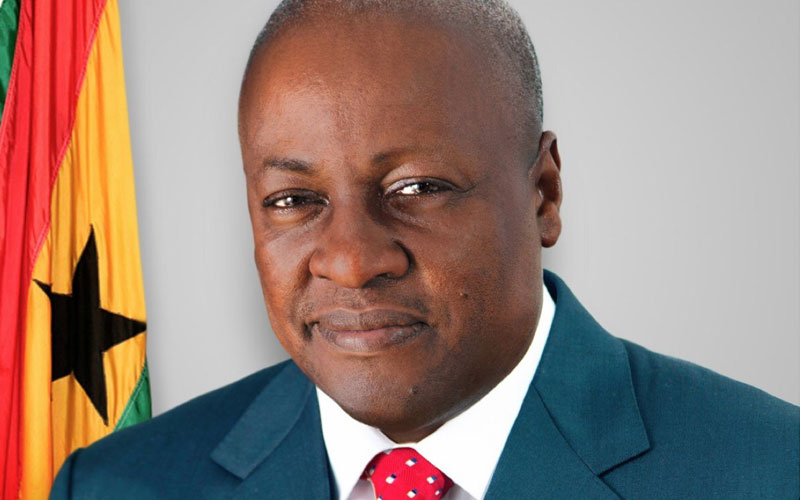Having ascended to the Presidential office in June 2012, following the untimely death of his predecessor John Atta Mills, John Dramani Mahama was officially elected as President of Ghana in December 2012 after serving the remaining five months of the late President Mills’ term.

A communication expert, historian, and writer, President Mahama had previously served as the Vice President (since 2009) and before that as a Member of Parliament, as well as completing a spell as Minister of Communications between 1998 and 2001.
Born in 1958 in Damongo, Ghana, Mahama went on to study at the University of Ghana, where he read History, and received his Bachelor of Arts Degree in 1981. He furthered his education by doing Post Graduate Studies in Communication, also at the University of Ghana. Mahama’s great thirst for knowledge also compelled him to take advantage of the opportunity to study a post graduate diploma in social psychology from the Institute of Social Sciences in Moscow.
Upon his return to Ghana he worked as the Information, Culture and Research Officer at the Embassy of Japan in Accra between 1991 and 1995, before moving on to become the International Relations, Sponsorship, Communication and Grants Manager at the Ghana Office of PLAN International, an international development charity that has committed itself to alleviating child poverty and improving the lives of children all over the world.
Mahama was first elected to the Parliament of Ghana in the 1996 elections to represent the Bole/Bamboi constituency for a four-year term, in which time he was also appointed as Deputy Minister of Communications and later the substantive Minister of Communications. During his tenure as MoC, Mahama also served as the Chairman of the National Communications Authority, in which capacity he played a key role in stabilising Ghana’s telecommunications sector after it was deregulated in 1997.
Mahama would go on to serve a further two terms as a Member of Parliament for his constituency before becoming Vice President in 2009, as well as serving as the Minority Spokesman for Communications in Parliament from 2001 to 2004 and the Minority Spokesperson on Foreign Affairs from 2005 to 2008. He was also the Director of Communications of the National Democratic Caongress and played a key role in giving voice to the party’s positions on matters of governance and social significance when the party was in opposition.
On the passing of President John Atta Mills on 24th July 2012, John Mahama took over the reins of Government and led the country to bid a befitting farewell to a leader who was much loved and respected Ghanaian icon.
President Mahama is an avid reader, author and historian and has written for many newspapers and publications. In 2012 he published his first book, a memoir entitled “My First Coup D’etat and other true stories from the lost decades of Africa”. Mr. Mahama has attributed the combination of his studies in history, communications and social psychology as having a profound effect on the shaping of his philosophy, his thoughts and his understanding, contributing significantly to making him the person he is today. His love of communicating is also apparent in the fact that he is one of Africa’s most-followed leaders on the social networking sites, Twitter and Facebook.
Ghana overview
Over the last two decades, Ghana has evolved into a model for political and economic reform in Africa, as well as a beacon of progress, democracy and stability.
As the first place in sub-Saharan Africa where Europeans arrived to trade, Ghana later became the first nation in the region to achieve independence from a colonial power – in this case Britain – and following years of mostly-military rule, the 1992 constitution that allowed for a multi-party system ushered in a new era of democracy.
Today it is one of most stable countries on the continent thanks to its good performance on democratic governance, arising from its strong multi-party political system, growing media pluralism and strong civil society activism. The positive effects of improvements in governance, the effectiveness of public institutions, as well as persistent economic growth have also resulted in Ghana attaining the status of a lower middle income country, according to the World Bank.
One of the Africa’s fastest growing economies, Ghana is expected to maintain robust growth over the medium term, bolstered by improved oil and gas production, increased private-sector investment, improved public infrastructure development and sustained political stability. The country continues to be the world’s second largest cocoa producer behind Ivory Coast, Africa’s biggest gold miner after South Africa, as well as the continent’s newest oil producer.
Aside from its notable economic growth, Ghana has also made impressive gains in the area of social development, making substantial progress in meeting the World’s Bank’s Millennium Development Goals. Targets for the reduction of extreme poverty and access to safe drinking water have been achieved, while other objectives on hunger, education and gender are well on track.
0 COMMENTS